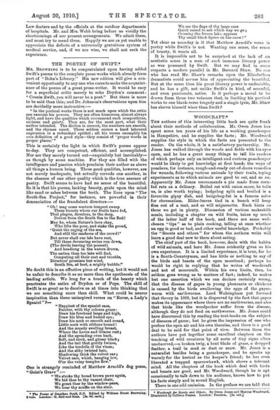THE POETRY OF SWIFT.*
MR. BROWNING is to be congratulated upon having added Swift's poems to the complete prose works which already form part of "Bohn's Library." His new edition will give a con- venient opportunity to any one who cares to make the acquaint- ance of the poems of a great prose-writer. It would be easy for a superficial critic merely to echo Dryden's comment : " Cousin Swift, you will never be a poet." But there is more to be said than this ; and Dr. Johnson's observations upon him are decidedly more instructive :- " In the poetical works there is not much upon which the critic can exercise his powers. They are often humorous, almost always light, and have the qualities which recommend such compositions, easiness and gaiety. They are, for the most part, what their author intended. The diction is correct, the numbers are smooth, and the rhymes exact. There seldom occurs a hard laboured expression or a redundant epithet ; all his verses exemplify his own definition of a good style—they consist of 'proper words in proper places.'"
This is certainly the light in which Swift's poems appear to-day. They are competent, efficient, and accomplished. Nor are they merely turned out—exquisitely but inevitably— as though by some machine. For they are filled with the intelligence and passion which proclaim their author as above all things a human being. These good qualities, however, are not merely inadequate, but actually corrode one another, in the absence of one other quality which is the true essence of poetry. Swift seems to have had no sense of the beautiful. So it is that his poems, lacking beauty, grate upon. the mind like sand or ashes between the teeth. The lines upon " The South-Sea Project," for instance, are powerful in their denunciation of the fraudulent directors :—
" Oh ! may some western tempest sweep
These locusts whom our fruits have fed, That plague, directors, to the deep,
Driven from the South Sea to the Red! May he, whom Nature's laws obey,
Who lifts the poor, and sinks the proud, `Quiet the raging of the sea, And still the madness of the crowd!' But never shall our isle have rest, Till those devouring swine run down, (The devils leaving the possest) And headlong in the waters drown. The nation then too late will find, Computing all their cost and trouble, Directors' promises but wind, South Sea, at best, a mighty bubble."
No doubt this is an effective piece of writing, but it would not be unfair to describe it as no more than the apotheosis of the leading article. We long for a touch of the beauty which penetrates the satire of Dryden or of Pope. The skill of Swift is so great as to deceive us at times into thinking that we see something more than skill. What could be nearer inspiration than these uninspired verses on "Rover, a Lady's Spaniel "10---.
" Happiest of the spaniel race, Painter, with thy colours grace: Draw his forehead large and high, Draw his blue and humid eye; Draw his neck so smooth and round, Little neck with ribbons bound! And the muscly swelling breast, Where the Loves and Graces rest ; And the spreading even back, Soft, and sleek, and glossy black; And the tail that gently twines, Like the tendrils of the vines; And the silky twisted hair, Shadowing thick the velvet ear; Velvet ears, which, hanging low, O'er the veiny temples flow."
One is strangely reminded of Matthew Arnold's dog poem, " Geist's Grave " :— " We stroke thy broad brown paws again, We bid thee to thy vacant chair, We greet thee by the window-pane, We hear thy scuffle on the stair.
• The Panes of Jonathan, Swift, D.D. Edited by William Ernst Browning. 3 vole. London : G. Bell and Sons. Os. 6d. each.) We see the flaps of thy large ears Quick raised to ask which way we go ; Crossing the frozen lake, appears Thy small black figure on the snow !"
Yet clear as noonday is it that Matthew Arnold's verse is poetry while Swift's is not. Wanting one sense, the sense of beauty, it wants all.
It is impossible not to be surprised at the lack of an aesthetic sense in a man of such immense literary power as was possessed by Swift. But we may find in some respects a modern parallel in Mr. Bernard Shaw. No one who has read Mr. Shaw's remarks upon the Elizabethan dramatists could accuse him of appreciating the beautiful. But at the same time his great literary power is undeniable,
and he has a gift, not unlike Swift's in kind, of scornful, and even passionate, satire. Is it perhaps a moral to be drawn from these two volumes that, in limiting his poetical works to one blank-verse tragedy and a single lyric, Mr. Shaw
has shown himself wiser than Swift ?






































 Previous page
Previous page